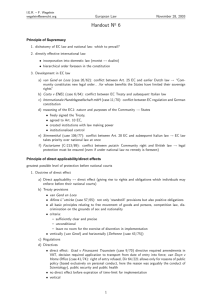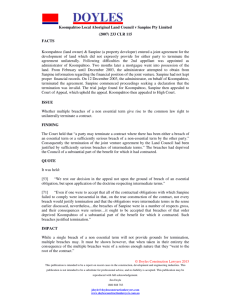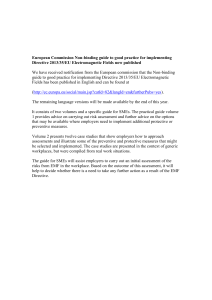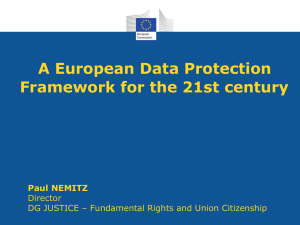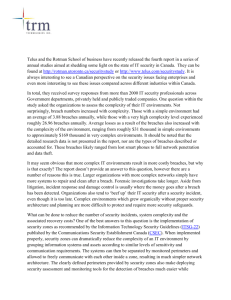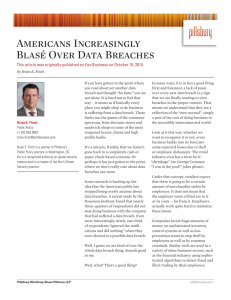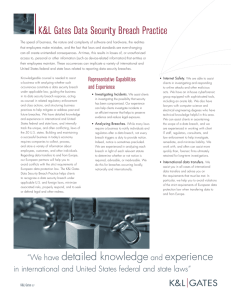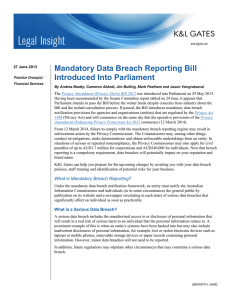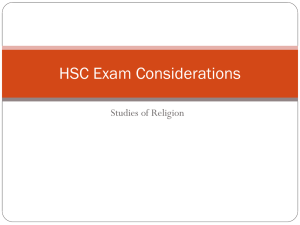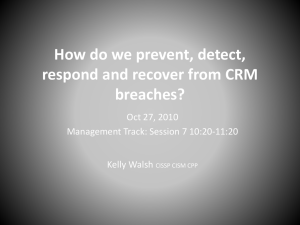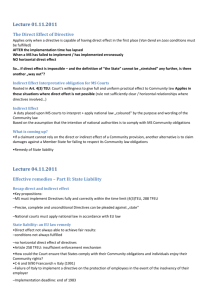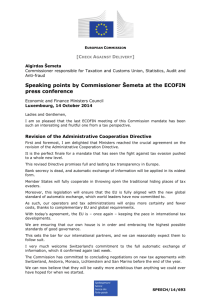Implications of the European Data Protection
advertisement
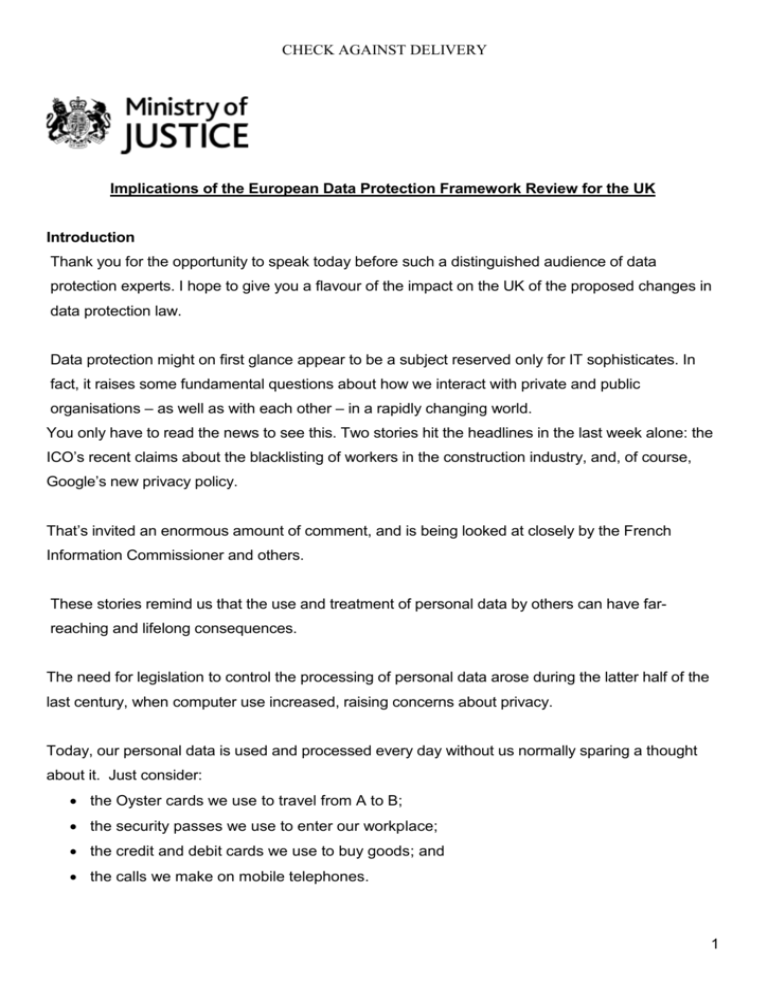
CHECK AGAINST DELIVERY Implications of the European Data Protection Framework Review for the UK Introduction Thank you for the opportunity to speak today before such a distinguished audience of data protection experts. I hope to give you a flavour of the impact on the UK of the proposed changes in data protection law. Data protection might on first glance appear to be a subject reserved only for IT sophisticates. In fact, it raises some fundamental questions about how we interact with private and public organisations – as well as with each other – in a rapidly changing world. You only have to read the news to see this. Two stories hit the headlines in the last week alone: the ICO’s recent claims about the blacklisting of workers in the construction industry, and, of course, Google’s new privacy policy. That’s invited an enormous amount of comment, and is being looked at closely by the French Information Commissioner and others. These stories remind us that the use and treatment of personal data by others can have farreaching and lifelong consequences. The need for legislation to control the processing of personal data arose during the latter half of the last century, when computer use increased, raising concerns about privacy. Today, our personal data is used and processed every day without us normally sparing a thought about it. Just consider: the Oyster cards we use to travel from A to B; the security passes we use to enter our workplace; the credit and debit cards we use to buy goods; and the calls we make on mobile telephones. 1 CHECK AGAINST DELIVERY Why change? While there have been many successes in preventing the misuse of information, there can be no doubt that the world we live in is rapidly evolving. The extraordinary pace of technological innovation, increasing global interdependence and the growing flow of people and information within and across borders presents a significant challenge. No one can be sure what further changes may be around the corner, but we must be take the right steps now to create an environment in which: business can prosper; the police can protect the public; and individuals’ privacy is safeguarded. In the current environment of cloud computing, social networking and the like, people want to know that their personal information is secure and not exposed to criminal activity or unnecessary state interference. But they also want to be able to share the benefits of their personal data being used effectively. So the focus of current debate is how we can put rules in place that have individuals’ rights at their heart, whilst allowing room for innovation and growth. I believe that the starting point for an effective system of data protection is that the use of personal data should be lawful, fair and secure, and that data itself should be kept for no longer than is necessary. These are the principles that formed the basis of the first data protection laws in the UK some 30 years ago. I believe they are still pertinent today. They transcend technological and political developments and their strength lies in their generality. Of course if these principles become inadequate or no longer effective, we would need to look to revisit them. But we should be mindful about being excessively prescriptive and failing to take account of the subtle nuances – both legal and practical – in introducing changes to data protection rules across 27 Member States. The Justice Secretary made a speech last year in which he drew a rather apt comparison with the very idealistic proponents of Esperanto. 2 CHECK AGAINST DELIVERY It’s a fact of life that we live in a multi-lingual world. But, whatever the inconveniences this brings, it’s a challenge that is never going to be solved by inventing a universal additional language. Indeed, the one solution guaranteed not to work faced with a multiplicity of languages is an additional tongue that no one speaks. What we need instead is to improve our ability to understand each others’ languages. In the context of data protection rules, we should look to better understand each other and our respective laws, rather than re-working existing principles and introducing a ‘one size fits all’ regulatory framework. EU data protection instruments So what does the new framework for data protection look like? On 25th January, the European Commission unveiled two new instruments. The Regulation proposed by the Commission would replace the existing Data Protection Directive and apply across the board to regulate data protection in general. It would cover data controllers in the public and private sectors, with exemptions where needed – for instance, for journalism, public security and dealing with criminal offences. If adopted, the Regulation would apply directly in all Member States, including the UK. The draft Directive would replace the existing Data Protection Framework Decision, which covers the former third pillar areas of police and judicial co-operation in criminal matters. The proposals are far-reaching and have already provoked widespread discussion. I want to touch on just a few of the proposed changes and the questions they pose. First, the so-called ‘right to be forgotten’. This is an area where I would sound a note of caution. The central provision is that data subjects have the right to request the erasure of data about themselves if it is no longer being processed. The aim of this is commendable. But its effects must be both proportionate and workable. We must beware of offering something we can’t deliver. Whilst it may be appealing to delete our histories, it’s clear that this won’t be possible all the time. The proposal before us recognises that 3 CHECK AGAINST DELIVERY there are circumstances where a right to be forgotten simply won’t work: for example, in healthcare, crime, and maintaining a free and vibrant press. We would support these exemptions. But we must be conscious that organisations may face extra burdens from having to explain why the right doesn’t apply in a given case. Credit reference is another area where people sometimes like to be forgotten. Yet businesses should have the right to conduct due diligence to assess the merits and financial means of an individual. This isn’t the time to be undermining responsible lending, or hampering businesses taking legitimate measures to prevent financial crime. On a more fundamental level, in a digital age where data is transferred and replicated in a matter of seconds, we have to ask how this would actually work. The proposal rightly provides carve-outs for freedom of expression, safeguarding economic interests of Member States and other important areas. We welcome these and will examine them closely. But my concern is that we may be running the risk of setting the standard so high that we don’t achieve a model that works in practice. Second, I want to highlight the significant impact that the Regulation could have on business and the public sector, through increased regulatory costs. I am speaking here in particular about the requirement to designate data protection officers and to conduct data protection impact assessments. This comes at a time when the Government is seeking to bear down on the regulatory burden on businesses and reduce excessive regulation. You’ll know that the UK is particularly keen to ensure that the new proposals don’t place onerous burdens on small and medium enterprises (SMEs). We want to avoid SMEs being overwhelmed by changes that are prescriptive and disproportionate to the ends envisaged. I would like to think these views are shared by many of you here today. 4 CHECK AGAINST DELIVERY I’m encouraged by the Commission’s recognition of SME-specific concerns in the proposal. It’s not that SMEs won’t be processing sensitive personal data and shouldn’t stick to the rules, but at a time when we should all be “thinking small first”, as they say, the particular impact on small businesses cannot be ignored. I’d like to say a word too about the proposal to notify the data protection authority of a data breach within 24 hours. In recent years, there has been an increasing number of high profile data security breaches across all sectors, including financial services, retail and the public sector. It is obviously important that organisations notify data breaches to the data protection authority. But a requirement for notification within 24 hours may delay important work to mitigate or remove the breach and ensure the data is protected again as quickly as possible. The existing rules on data breach notification for communications service providers in the revised E-privacy Directive could provide a useful precedent for us to consider. [Those rules set out that, when a personal data breach occurs, the provider has to report this to the Information Commissioner “without undue delay”.] Finally, a particular headline grabber has been the proposal for data protection authorities to impose fines of up to 2% of an enterprise’s annual worldwide turnover where there has been a breach of certain requirements of the Regulation. The Government supports the principle of imposing administrative sanctions. In the UK the Information Commissioner can already impose a Civil Monetary Penalty of up to £500,000 for the most serious breaches of the Data Protection Act’s principles. But it is important that fines are proportionate, particularly in cases that involve breaches of the Regulation’s bureaucratic requirements as opposed to those which cause actual harm to data subjects. The UK position and next steps You will appreciate that I can’t stand here with discussions ongoing in the EU and reveal a full negotiating position for the UK. 5 CHECK AGAINST DELIVERY But what I can say is that our approach is informed by a number of factors. These are: the need for a proper evidence-base; the actual benefits to data subjects; the resource implications for data controllers; and the impact on, and views of, our Information Commissioner as well as other experts in the field. So what are the next steps for the proposed new framework? The Regulation and Directive will be negotiated by EU Member States and the European Parliament before becoming law. The timing is not an exact science, but I would say we are talking well beyond the end of this year. After that, there will be a period of two years for implementation and for the Regulation to come into effect. The Government is considering the provisions in detail and will continue to consult extensively both with those within government and outside of it. A wide range of views and evidence will certainly help during the negotiations. To that end, the Ministry of Justice issued a Call for Evidence in February, inviting views on both the Regulation and Directive from affected businesses, the public sector, charities, civil liberties and consumer groups across the UK. This closed on Tuesday, and we are now considering the responses. I hope some of you took the opportunity to put forward your views. This exercise will complement the previous Call for Evidence, held in 2010 in preparation for the Commission’s proposals. Conclusion This is not the end of the story: there will be new ideas and new drafts to consider as the process goes on, and we will be returning to the experts in some form as the proposals go through their various iterations. We don’t underestimate the scale of the task that lies ahead – getting all 27 Member States and the European Parliament to agree new data protection legal instruments will not be easy. 6 CHECK AGAINST DELIVERY But we will try our best to take on board the evidence and work constructively in the EU to end up with a good outcome. I hope all of us – techies, experts and laymen alike – will keep the conversation going. 7
